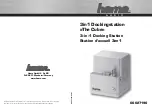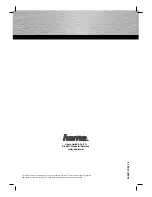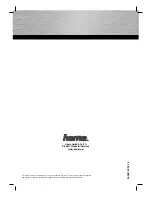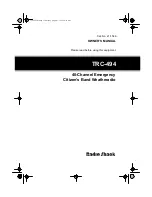
Weather Station Suntracer KNX sl
1
Weather Station Suntracer KNX sl
• Version: 08.10.2019 • Technical changes and errors excepted. • Elsner Elektronik GmbH • Sohlengrund 16 • 75395 Ostelsheim • Germany • www.elsner-elektronik.de •
Technical Service: +49 (0) 7033 / 30945-250
Suntracer KNX sl
Weather Station
Technical specifications and installation instructions
Item number 70154
1.
Description
The
Weather Station Suntracer KNX sl
for the KNX building bus system mea-
sures temperature, wind speed, brightness and air pressure. It recognises precipi-
tation and receives the GPS signal for time and location. In addition, using location
coordinates and the time, it calculates the exact position of the sun (azimuth and
elevation).
All values can be used for the control of limit dependent switching outputs. States
can be linked via AND logic gates and OR logic gates. Multi-function modules
change input data as required by means of calculations, querying a condition, or
converting the data point type.
The integrated shade control system allows intelligent sun protection control of up
to 8 façades.
The compact housing of the
Suntracer KNX sl
accommodates the sensors, eva-
luation circuits and bus-coupling electronics.
Functions:
•
Brightness measurement
(current light strength)
•
GPS receiver
, outputting the current time and location coordinates. The
Weather Station Suntracer KNX sl
also computes the position of the sun
(azimuth and elevation)
•
Shade control
for up to 8 façades with slat tracking and shadow edge
tracking
•
Wind measurement
: The wind strength is measured electronically and
thus noiselessly and reliably, even during hail, snow and sub-zero
temperatures. Even turbulent air and rising winds in the vicinity of the
device are recorded
•
Precipitation detection
: The sensor surface is heated, so that only drops
and flakes are recognised as precipitation, but not mist or dew. When the
rain or snow stops, the sensor is soon dry again and the precipitation
warning ends
• Temperature measurement
•
Frost protection for shading systems
• Air pressure measurement
•
Weekly and calendar time switch
: All time switching outputs can be
used as communication objects.
The
weekly time switch
has 24 periods. Each period can be configured
either as an output or as an input. If the period is an output, then the
switching time is set per parameter or per communication object.
The
calendar time switch
has 4 periods. Two on/off switching operations,
which are executed daily, can be set for each period
•
Switching outputs
for all measured and computed values. Threshold
values can be adjusted per parameter or via communication objects
•
8 AND and 8 OR logic gates
, each with 4 inputs. All switching events as
well as 16 logic inputs (in the form of communications objects) can be used
as inputs for the logic gates. The output of each gate can be configured
optionally as 1-bit or 2 x 8-bit
•
8 multi-function modules
(computers) for changing the input data by
calculations, by querying a condition or by converting the data point type
•
Summer compensation
for cooling systems. A characteristic curve
matches the target temperature in the room to the external temperature and
sets the minimum and maximum target temperature values.
Configuration is made using the KNX software ETS. The
product file
can be dow-
nloaded from the Elsner Elektronik website on
www.elsner-elektronik.de
in the
“Service” menu.
1.0.1. Deliverables
•
Sensor
•
Connection cable approx. 10 m, with plug and connecting terminals
•
Surface-mounted junction box (IP 55, not weatherproof)
•
Worm-thread clamp Ø 40-60 mm
•
4×50 mm stainless steel roundhead screws and 6×30 mm dowels for wall
mounting. Use fixing materials that are suitable for the base!
•
Fix mounting with installation accessories
1.1. Technical specification
Weather Station:
Mounting arm Fix:
The product conforms with the provisions of EU directives.
2.
Installation and start-up
2.1. Installation notes
Installation, testing, operational start-up and troubleshooting should
only be performed by an electrician.
CAUTION!
Live voltage!
There are unprotected live components inside the device.
•
National legal regulations are to be followed.
•
Ensure that all lines to be assembled are free of voltage and take
precautions against accidental switching on.
•
Do not use the device if it is damaged.
•
Take the device or system out of service and secure it against
unintentional use, if it can be assumed, that risk-free operation is no
longer guaranteed.
The device is only to be used for its intended purpose. Any improper modification
or failure to follow the operating instructions voids any and all warranty and gua-
rantee claims.
After unpacking the device, check it immediately for possible mechanical damage.
If it has been damaged in transport, inform the supplier immediately.
The device may only be used as a fixed-site installation; that means only when as-
sembled and after conclusion of all installation and operational start-up tasks and
only in the surroundings designated for it.
Elsner Elektronik is not liable for any changes in norms and standards which may
occur after publication of these operating instructions.
2.2. Installation location
Select an installation position on the building where the sensors can measure
wind, rain and sunshine without hindrance. No structural elements should be
mounted above the weather station, from which water could continue to drop on
the precipitation sensor even after it has stopped raining or snowing. The weather
station should not be shaded by structures or, for example, trees.
At least 60 cm of clearance must be left around the device. This facilitates correct
wind speed measurement without eddies. At the same time, this prevents spray
(raindrops hitting the device) or snow (snow penetration) from impairing the mea-
surement. The wind sensor must not come into contact with water. The distance
also prevents birds from biting the sensor.
The mounting position must be selected so that the sensors for rain and wind can-
not be touched by persons.
Please ensure that the extended awning does not cast shade on the device, and
does not protect the device against wind.
Temperature measurements can also be distorted by external influences such as
warming or cooling of the building structure on which the sensor is mounted (sun-
light, heating or cold water pipes). Temperature variations from such sources of in-
terference must be corrected in the ETS in order to ensure the specified accuracy
of the sensor (temperature offset).
Magnetic fields, transmitters and interference fields from electrical consumers
(e.g. fluorescent lamps, neon signs, switch mode power supplies etc.) can block or
interfere with the reception of the GPS signal.
2.2.1. Position of the sensors
ATTENTION!
Sensitive wind sensor.
•
Remove the protective transport sticker after installation.
•
Do not touch the sensor on the wind measuring element
(on bottom, recessed).
Housing
Plastic
Colour
White / Translucent
Assembly
Surface mount
Protection category
IP 44
Dimensions
approx. 62 × 71 × 152 (W × H × D, mm)
Connection cable
4-wire (bus +/-, auxiliary v/-),
diameter approx. 5 mm
Weight
weather station with mounting approx. 90 g,
total weight with accessories approx. 280 g
Ambient temperature
Operation -30…+50°C, storage -30…+70°C
Auxiliary supply
12…40 V DC, 12…28 V AC. An appropriate
power supply unit can be purchased from
Elsner Elektronik.
Auxiliary current
at 12V DC: max. 185 mA
at 24V DC: max. 90 mA
at 24V AC: max. 82 mA
Bus current
max. 10 mA
Data output
KNX +/-
BCU type
Integrated microcontroller
PEI type
0
Group addresses
max. 2000
Assignments
max. 2000
Communication
objects
1387
Temperature sensor:
Measurement range
-30°C … +50°C
Resolution
0.1°C
Accuracy
±0.5°C at -30°C … +25°C
±1.5°C at -30°C … +45°C
Wind sensor:
Measurement range
0 m/s … 35 m/s
Resolution
0.1 m/s
Accuracy
±15% of the measurement value when inco-
ming flow is 45°…315°
(Frontal incoming flow corresponds to 180°)
Pressure sensor:
Measurement range
300 mbar … 1100 mbar
Resolution
0.1 mbar
Accuracy
±4 mbar
Brightness sensor:
Measurement range
0 lux … 150,000 lux
Resolution
1 lux up to 300 lux
2 lux up to 1000 lux
25 lux up to 150.000 lux
Accuracy
±15% of the measurement value at 30 lux …
30,000 lux
Colour
powder-coated white RAL 9003
Total lenght
approx. 430 mm
Weight
approx. 190 g
Fig. 1
There must be at least 60 cm clearance
to other elements (structures, cons-
truction parts, etc.) below, to the sides
and in front of the device.
60 cm
Fig. 2
The device must be attached to a ver-
tical wall (or a pole).
Place the supply line in a loop before
leading it into the wall or junction box.
This will allow rain to drip off and not
drain into the wall or box.
Wall
or
pole
90°
Fig. 3
The device must be mounted in the
horizontal (transverse) direction.
Horizontal
Fig. 4
For installation in the northern hemis-
phere, the device must be aligned to
face south.
For installation in the southern hemis-
phere, the device must be aligned to
face north.
North
South
1 Brightness sensor
2 Precipitation sensor (area with
tracks)
3 Position of temperature sensor
4 Wind measuring element
3
2
1
4
Fig. 5
EN




















